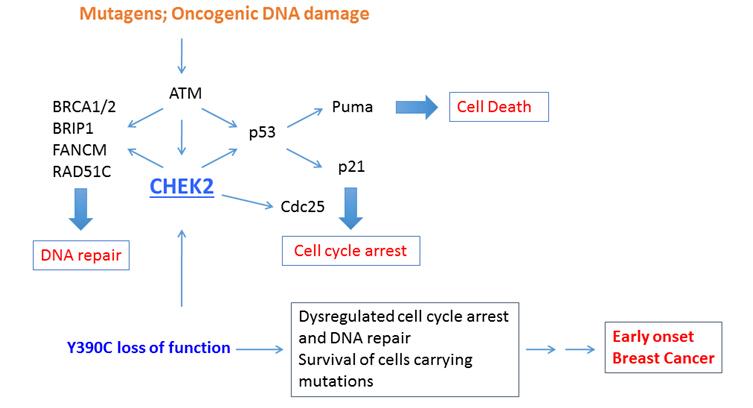
Breast cancer is the most frequently diagnosed cancer and the second leading cause for cancer death in females worldwide. In China, breast cancers are diagnosed almost 10 years younger than in United States and Europe, and higher percentage of patients are diagnosed before age 40 among Chinese than among Caucasians. However, the prevalence of Breast cancer type 1/2 susceptibility protein (BRCA1/2) mutations and reported Checkpoint kinase 2 (CHEK2) germline mutations is low or absent in Chinese population which suggests that Chinese early onset breast cancer may have other hereditary factors.
DING Hongyu and his colleagues from a research group led by Prof. JIANG Hai at the Institute of Biochemistry and Cell Biology, Shanghai Institutes for Biological Sciences of Chinese Academy of Sciences, collaborated with Prof. WANG Yajie of Changhai Hospital to search novel genetic alleles associated with early onset breast cancer in China.
The researchers identified a novel CHEK2 Y390C mutation in young, high risk breast cancer patients in China. This mutation exists in 12 of 150 patients (8.0%) and only two in 250 healthy controls (0.8%). Four of the Y390C carriers also have family history of breast and/or ovarian cancers, and Y390C carriers tend to develop breast cancer early, before 35 years of age. These facts indicate that the CHEK2 Y390C mutation is probably a novel hereditary factor in Chinese breast cancer patients.
CHEK2 is a central effector of cell’s response to DNA damage. Upon DNA damage, CHEK2 phosphorylates BRCA2, p53 and CDC25 to orchestrate DNA repair and cell cycle arrest, as well as cell death when the damage is beyond repair. Functional analysis suggested that the CHEK2 Y390C mutation is deleterious as judged by the mutant protein’s inability to inactivate CDC25A or to activate p53 after DNA damage. Cells expressing the CHEK2 Y390C mutant also showed impaired p21 and Puma expression after DNA damage. Such deregulated cell cycle checkpoint and apoptotic response may help conserve mutations and therefore contribute to tumourigeneisis. Moreover, cancer cells expressing the CHEK2 Y390C mutant showed resistance to important chemotherapy drugs, such as cisplatin and doxorubicin.
This study offers a new subject for breast cancer prevention and suggests the need of early monitoring of breast cancer in the 0.8% Y390C carriers in Chinese population. Novel therapeutic regimens should be considered for such breast cancer patients in clinics.
This study entitled “A novel recurrent CHEK2 Y390C mutation identified in high risk Chinese breast cancer patients impairs its activity and is associated with increased breast cancer risk” was published on Oncogene.
This work was supported by grants from the major scientific research project, National Natural Science Foundation of China, and Science and Technology Commission of Shanghai Municipality.

Figure: CHEK2 Y390C mutation leads to DNA repair dysfunction, deregulated cell cycle checkpoint and apoptotic response may help conserve mutations and therefore contribute to tumourigeneisis
(Image by Prof. JIANG Hai`s group)

86-10-68597521 (day)
86-10-68597289 (night)

52 Sanlihe Rd., Xicheng District,
Beijing, China (100864)

